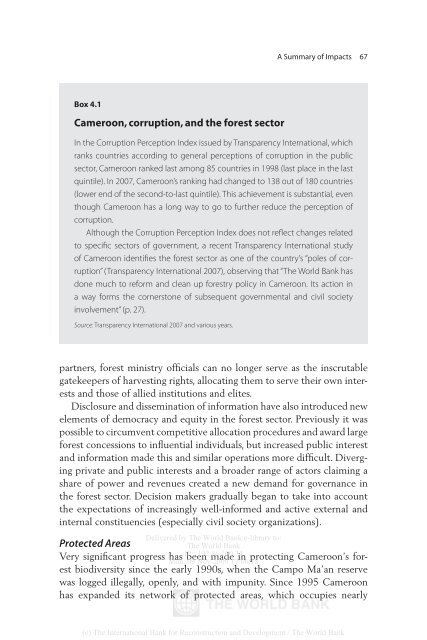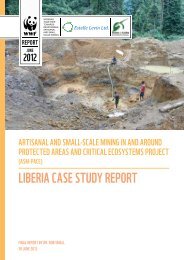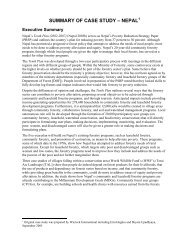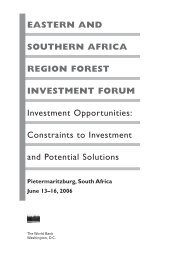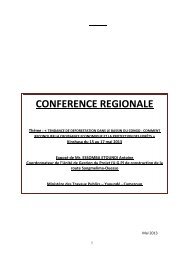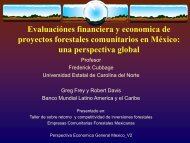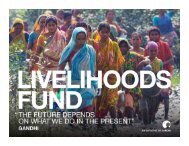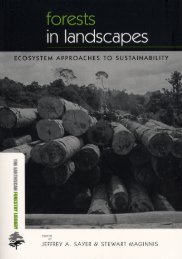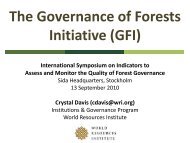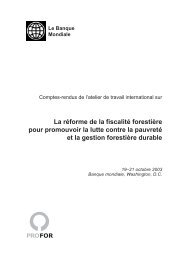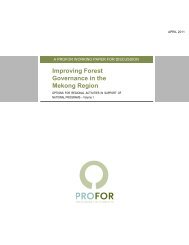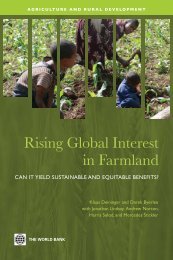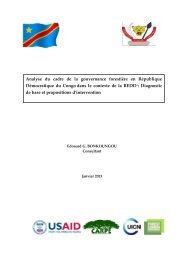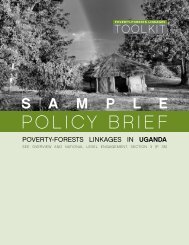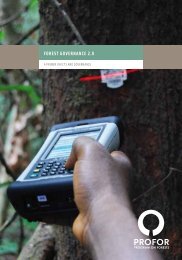The Rainforests of Cameroon - PROFOR
The Rainforests of Cameroon - PROFOR
The Rainforests of Cameroon - PROFOR
- No tags were found...
You also want an ePaper? Increase the reach of your titles
YUMPU automatically turns print PDFs into web optimized ePapers that Google loves.
A Summary <strong>of</strong> Impacts 67Box 4.1<strong>Cameroon</strong>, corruption, and the forest sectorIn the Corruption Perception Index issued by Transparency International, whichranks countries according to general perceptions <strong>of</strong> corruption in the publicsector, <strong>Cameroon</strong> ranked last among 85 countries in 1998 (last place in the lastquintile). In 2007, <strong>Cameroon</strong>’s ranking had changed to 138 out <strong>of</strong> 180 countries(lower end <strong>of</strong> the second-to-last quintile). This achievement is substantial, eventhough <strong>Cameroon</strong> has a long way to go to further reduce the perception <strong>of</strong>corruption.Although the Corruption Perception Index does not reflect changes relatedto specific sectors <strong>of</strong> government, a recent Transparency International study<strong>of</strong> <strong>Cameroon</strong> identifies the forest sector as one <strong>of</strong> the country’s “poles <strong>of</strong> corruption”(Transparency International 2007), observing that “<strong>The</strong> World Bank hasdone much to reform and clean up forestry policy in <strong>Cameroon</strong>. Its action ina way forms the cornerstone <strong>of</strong> subsequent governmental and civil societyinvolvement” (p. 27).Source: Transparency International 2007 and various years.partners, forest ministry <strong>of</strong>ficials can no longer serve as the inscrutablegatekeepers <strong>of</strong> harvesting rights, allocating them to serve their own interestsand those <strong>of</strong> allied institutions and elites.Disclosure and dissemination <strong>of</strong> information have also introduced newelements <strong>of</strong> democracy and equity in the forest sector. Previously it waspossible to circumvent competitive allocation procedures and award largeforest concessions to influential individuals, but increased public interestand information made this and similar operations more difficult. Divergingprivate and public interests and a broader range <strong>of</strong> actors claiming ashare <strong>of</strong> power and revenues created a new demand for governance inthe forest sector. Decision makers gradually began to take into accountthe expectations <strong>of</strong> increasingly well-informed and active external andinternal constituencies (especially civil society organizations).Delivered by <strong>The</strong> World Bank e-library to:Protected Areas<strong>The</strong> World BankVery significant progress has IP been : 192.86.100.34 made in protecting <strong>Cameroon</strong>’s forestbiodiversity since the early 1990s, when the Campo Ma’an reserveMon, 09 Nov 2009 17:06:18was logged illegally, openly, and with impunity. Since 1995 <strong>Cameroon</strong>has expanded its network <strong>of</strong> protected areas, which occupies nearly(c) <strong>The</strong> International Bank for Reconstruction and Development / <strong>The</strong> World Bank


